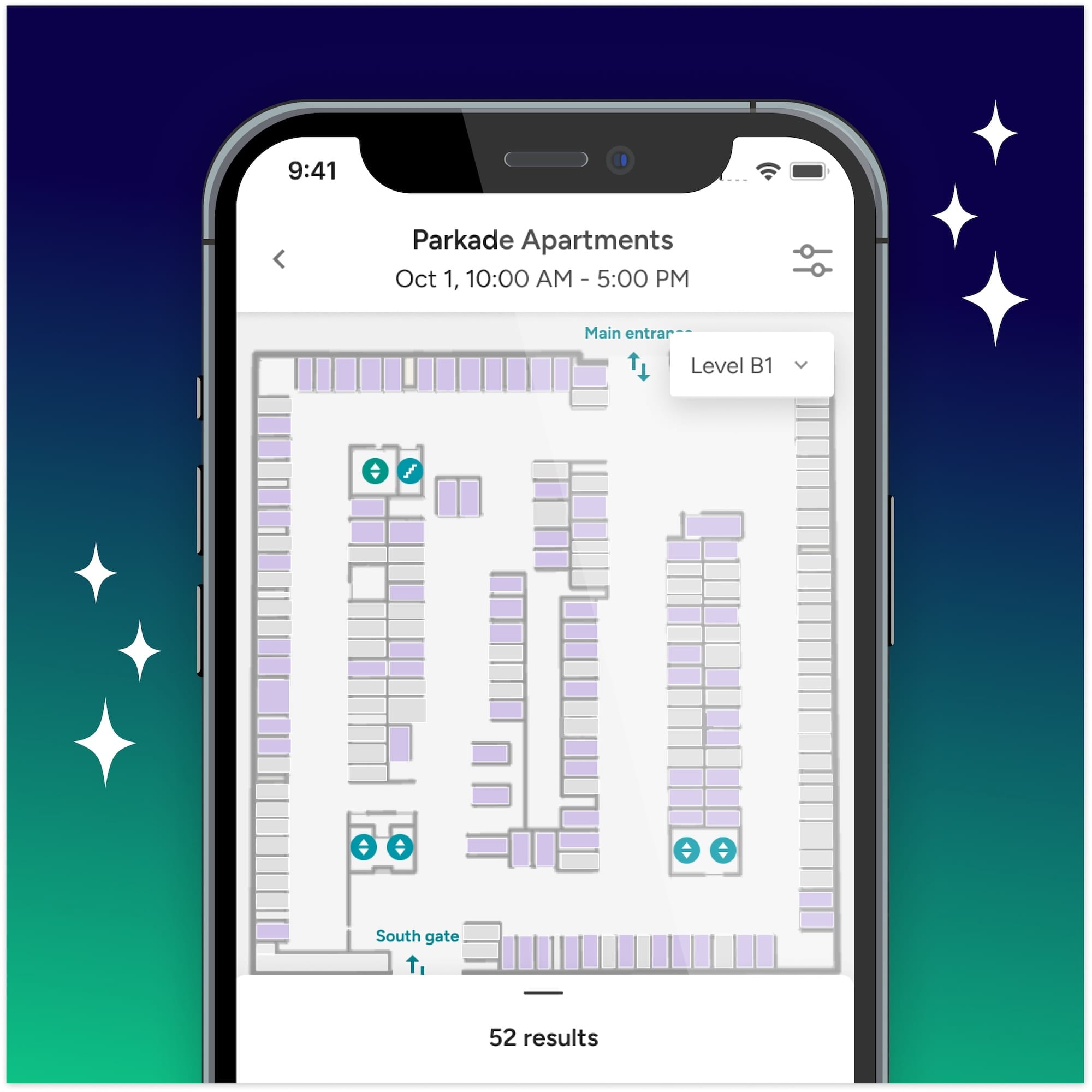

TABLE OF CONTENTS
Recent years have seen a rise in popularity of mixed-use developments. The appeal of compact and pedestrian-friendly spaces has demonstrated that city residents are increasingly seeking a variety of uses in their neighborhoods.
Being able to grab a coffee, stop into the library, or browse a local store without having to jump into the car again (or at all) gives mixed-use development a leg up on sprawling strip malls and standalone restaurants built in a sea of parking lots.
When it comes to building these types of developments, though, things can get a little more complicated, especially when cars come into the equation. Although mixed-use development pairs naturally with dense urban cities, it can be a bit of a head-scratcher if parking is required.
When it comes to planning a mixed-use development, it’s important to have a strategy for the layout and allotment of the parking in order to make sure car use doesn’t take up too much space in the development.
The cost and space usage of parking makes it in the best interest of a developer to maximize its use within the development. Although most developments in the U.S. have to build a minimum amount of parking to adhere to local regulations, building more parking on top of that can be avoided with proper planning and parking management.
Mixed-use developments also come with their own advantages, such as sharing opportunities and expanded rental agreements, which can be leveraged to keep the development’s parking lot efficient and well-used.
Before we talk about the strategies that can be used to improve your mixed-use parking management, let’s discuss a few of the challenges that are inherent to parking at a mixed-use development.
Traditionally, one of the most challenging things about parking management at mixed use buildings is appropriately allocating parking for different types of uses, while also considering the sizes of units. Different types of uses require varying amounts of parking. These various uses will also experience a wide range of parking times, duration, and more.
Residents of a building who own a car always need to park their car for overnight periods, while visitors to restaurants or retail often require parking for no more than an hour or two. Convenience and grocery store visits are typically even shorter, not exceeding 15 to 20 minutes for most people, leading to a lot of cars coming and going between spaces throughout the day.
What quickly becomes clear about mixed-use developments is that some parking uses will naturally complement each other, while others will not. Complementary uses can share parking, allowing the developer to avoid having to allot specific parking areas for each individual use. Some uses, on the other hand, may not be as complementary, making the equation a little more complicated.
So how do you address this problem? Luckily, technology has offered a more efficient way to manage parking at many levels for a mixed-use development. Let’s take a look at a few parking strategies you can use for mixed-use developments. Note: some of these strategies are mutually exclusive, making you have to decide which approach works better for your development.
Shared parking isn’t anything new. There are many uses that complement each other when it comes to parking. Office uses and restaurants are ideal examples. The typical evening restaurant and office space can use the same parking lot. Most office spaces clear out around 5 pm, while most restaurants open for dinner don’t start receiving guests until after that time. If these are the types of uses you're including in your development, consider lumping their parking allotment together.
Some uses might not be natural for parking sharing. A coffee shop, for example, is typically more of a daytime establishment, and can’t share parking as easily with an office also being used during the day. With many workers going remote these days, though, offices may be able to share more parking than they would in the past.
There’s also a lot of crossover parking in mixed use projects. Ben Weber, a parking planner for Walker Consultants, has collected data showing that many users park once for several uses. This fact can then be inputted into the parking model to reduce parking needs for that development.
Another strategy is sharing parking with an existing parking lot outside of the development. As Ben Weber puts it:
"If there’s already plenty of parking near your development, you could form a shared parking agreement, such as subleasing the parking lot for your own uses."
– Ben Weber, Walker Consultants
He continues, "One problem is that the parking owners often don’t want to get into long-term parking agreements, keeping it free if a future tenant needs it. You also have to consider factors such as insurance when making such agreements work."
Due to the nature of residential parking, users need to be able to access parking 24/7 and keep their car parked for as long as they need. Because of that, one common strategy for residential uses at a mixed-use development is to assign spaces just for residents, ideally kept separate from the rest of the parking. A specific part in the garage or parking lot can be allotted for residential use, using good signage or physical barriers to make it clear that it is a separate parking area.
If you do decide to keep residential uses separate, then you won’t be able to implement sharing between residential and other uses, which is a big part of other strategies mentioned in this article.
Mixed-use projects can also choose to make their parking unbundled, typically on the residential side. Ben Weber points out that multifamily housing projects are increasingly not offering assigned parking spaces with their units, decreasing the parking footprint of the residential side of a development and freeing it up for sharing opportunities.
nbundled parking allows residents to purchase a space if they require one, ensuring that valuable space isn’t wasted on apartment buildings that don’t need parking. In more urban environments where driving isn’t necessary for many residents, this system will allow you to keep parking only for residents that absolutely need it.
Unbundled parking has been estimated to save money for developers, and for renters as a result. A 1999 study found that a unit with off-street parking sold for 13 percent more than comparable units without off-street parking. Outside of building the minimum parking required for the development, developers can use these tools to reduce the amount of parking they need to build and transfer these savings to renters.
Expanding the options for renting parking at your mixed-use building can allow people to rent and distribute their parking as they see fit. For example, building managers who rent unbundled spaces to residents can allow that renter to essentially sublease their spot to someone else for certain time periods.
With this system, someone who works daytime hours away from home can lease out their space to someone who will be using that development during the day. This can work in the inverse way too, with a commercial use leasing out their parking once they head back home to a restaurant with dinner customers.
Because of the complexity of mixed-use parking and unbundled parking systems, a more sophisticated system can be helpful to managing it effectively. Many of these modern parking management systems allow you to group together specific uses, manage parking contracts for specific spaces, and control access to parking lots and garages. These systems can take the complexity out of the process of allocating and managing parking for mixed-use developments.
The above example, of subleasing out your parking spot to someone while you’re away from home, is made possible by these modern parking management systems. Handling these complex arrangements used to require strict management and complicated spreadsheets. With modern technology, parking rentals and subleases are shown plainly within the system.
One common problem with mixed-use developments is that residents and their guests often park in retail parking lots. Although the separate residential parking strategy could help alleviate this problem, overflow parking from residential might still seep into the parking. This makes implementing a better system a necessity for mixed-use buildings, especially one that requires everyone to pay for parking.
To assist with parking management at mixed-use developments, Parkade has implemented a new tool called Rule Sets. Essentially, Rule Sets allows buildings to lump different types of tenants into groups based on unit type. Then, the building’s management can control the amount and price of parking that these different groups can reserve.
For example, Rule Sets at Parkade allow you to easily separate residential and commercial tenants at your development, offering them different prices based on the size of their unit. Rule Sets also allow you to separate parking rented to the public from parking you rent to tenants. This system allows you to keep parking affordable for those who rent space in your building, while also keeping open spaces at a premium for the public.
For retailers who want to upcharge or discount parking on certain dates, days of the week or hours of the day, Parkade’s calendar-based pricing feature allows parking admins to easily do so.
Additionally, with the rules feature, businesses can offer a certain amount of free parking at specific areas and even validate parking for restaurants and other retailers in the mixed use development by scanning a QR code.
Parkade allows you to fine-tune your system so that it effectively manages time-based parking use at your building. For navigating shared parking situations between commercial and residential uses, a system like Parkade’s is invaluable. The detailed records in Parkade’s system allows you to keep up with changes and adjust your parking offerings as needed.
With the right management approach and modern technology solutions, you can distill the complexity of a mixed-use parking area into an efficient system that works for every user of the building.
.jpg)
As parking management becomes increasingly digital, security becomes critical — and we’re excited to share that we've achieved a major security milestone.
Read Story
We’re thrilled to announce one of our most significant leaps forward this year: the launch of dynamic maps across our mobile and web applications.
Read Story
Now that AB 1317 is official, it’s time to brush up on the requirements and see how your properties stand to benefit.
Read Story